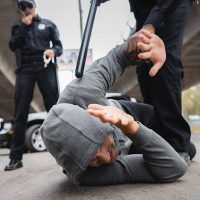Proving Police Brutality And Excessive Force

While law enforcement are heroes of the community, and do their best to try to keep all of us safe, they are still human. And like any human being, some are very good at their job, and others may not be.
That means that it is not unreasonable to believe that you may have been mistreated by police, or that you may have been a victim of excessive force, or police brutality.
Overcoming Bias
Proving police brutality or excessive force can be difficult, because in the eyes of the average juror, police can do no wrong.
Of course, the police help and protect us everyday, and the people that they may use excessive force against, may be people who were breaking the law in the first place. That means that there are a lot of inherent, pre-set beliefs and biases in jurors’ minds that have to be overcome, to show that the police did something wrong to injure someone.
Proving Inadequate procedures
Sometimes, police brutality may be obvious—video or body cam footage may show the inequity or difference between what the offender did or said, and the reaction the police had to what the offender may have done or said.
In other cases, proving police liability may take a deeper dive into the practices of the applicable police department.
Training or lack thereof, can be a good indicator of whether the police acted properly. What kind of training or educational materials is the department giving their officers? This can be especially important when the victim is a member of a special community, for example, if the victim were to be severely mentally disabled, homeless, or perhaps, elderly.
You might be surprised to learn that the police department did not provide sufficient trainings, or in some cases that they were actually training officers the completely incorrect way. Many departments, faced with budget cuts, won’t update their training materials, or will utilize trainers that don’t actually have experience in what they are supposed to be training the officers to do or not do.
What About the Officer?
An investigation into the allegedly negligent officer’s background may need to be conducted.
Does or did that officer have a history of brutality, excessive force, or other questionable activity, such that the department should not have allowed the officer to be “on the street?” Nobody has a perfectly clean background, and many police departments must work with the police union, and can’t just get rid of an officer just because he or she has a history of excessive force.
Negligence or Recklessness?
If an officer is totally reckless, and goes too far astray from his or her training, the police department could deny liability—that is, the department may say that it cannot be held responsible for a rogue officer’s behavior.
That means that victims must show that while the officer may have used excessive force, the officer was still, nonetheless, acting in the course and scope of, and in accordance with, his or her police training.
Were you injured because of police brutality or excessive force? Contact our Rhode Island injury lawyers at Robert E. Craven & Associates at 401-453-2700 for help.
Sources:
crcgroup.com/Tools-Intel/post/an-arresting-fact-municipalities-bear-growing-risk-for-police-actions
hrw.org/legacy/reports98/police/uspo30.htm

